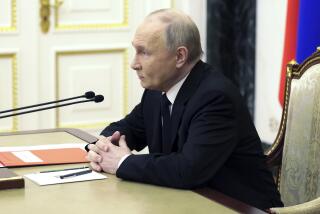Yeltsin Pushes for Constitution Based on Individual Rights : Russia: Lawmakers give their preliminary OK on the last day of a momentous session.
- Share via
MOSCOW — Russian Federation President Boris N. Yeltsin pushed lawmakers Saturday to adopt a draft constitution that he said would place the rights of individuals above the rights of the state for the first time in Russian history.
The lawmakers gave preliminary approval to the draft constitution on the closing day of a momentous session of the Congress of People’s Deputies, the Russian republic’s Parliament, during which Yeltsin won broad new powers to implement his radical economic reform plan.
By promoting the new constitution, Yeltsin was apparently trying to assure both lawmakers and the world that, although he had won vast new authority, he does not intend to use it to set up a dictatorship.
“The draft (constitution) contains secure legal guarantees against totalitarianism, against supremacy of ideology and against violence as a state ideology,” the 60-year-old president said in a Kremlin address.
Yeltsin stressed that it would be unacceptable for Russia to keep its current constitution.
“A constitution adopted by a totalitarian society cannot be a basis for a new society,” he said. “Adoption of the new constitution would enable Russia to join the world community as an equal.”
Yeltsin said that under the proposed constitution, “neither the Communist Party, nor the nation, nor any other party, but rather the individual himself is the supreme value.”
One part of the draft constitution, called the declaration on the rights and freedoms of a person and citizen, resembles the U.S. Bill of Rights.
“It was written in the spirit of the American document,” said Viktor L. Sheinis, a member of the congress’ constitutional commission and an author of the draft now under consideration.
Sheinis called the draft “revolutionary.”
“Past constitutions declared human rights, but in reality it was based on the priorities of the interests of the state,” he said.
Lawmakers “passed for consideration” the draft constitution--which envisions a strong presidency--and sent it back to committees to revise before submission to the next congress, scheduled in March.
The Constitutional Court, appointed earlier in the week, will be empowered to handle problems arising in the transition phase--before the new constitution is adopted and while the old constitution is still in effect, Sheinis said.
At the close of the congress, lawmakers remarked that it had been more effective than any of the four previous ones, including the founding congress in May, 1990, after the first multi-candidate election for a Russian Parliament.
This congress was also extraordinary because for the first time the Russian Parliament took the main political stage away from the Soviet Parliament. That reflected the dramatic shift of power from the Soviet government to the government of the republics after the August coup attempt.
“In my opinion, the main result of the congress is that for the first time since we began our work, the tasks facing the Parliament were fulfilled,” said Ramazan G. Abdulatipov, chairman of the Council of Nationalities, one of the Parliament’s two chambers. “At this congress, we for the first time gave up political struggles and got down to business.”
One of the main reasons for the increase in productivity was that the Russian Communist Party, which had led the main opposition to Yeltsin and his supporters, left the political arena after being discredited in August.
“Confrontation between the two almost equal parliamentary groups--which often had brought the Russian Parliament to a deadlock--disappeared,” the Tass news agency said in an analysis.
In addition to approving greater powers for Yeltsin to help him enact his reforms, the congress also elected a chairman, Ruslan I. Khasbulatov, and his four assistants, appointed judges for the Constitutional Court and debated the proposed constitution.
“The Fifth Russian Congress of People’s Deputies marked the transition to the radical economic reform, which may decide the destiny of Russia,” Tass said.
More to Read
Sign up for Essential California
The most important California stories and recommendations in your inbox every morning.
You may occasionally receive promotional content from the Los Angeles Times.













